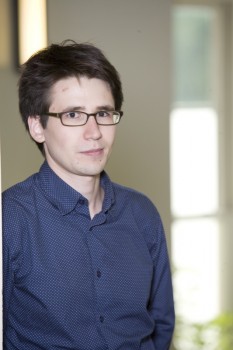Joshua Schrier Wins Cottrell College Science Award

Assistant Professor of Chemistry Joshua Schrier
Details
Assistant Professor of Chemistry Joshua Schrier has won a Cottrell College Science Award, which is given out by the almost 100-year-old Research Corporation for Science Advancement (RCSA). The award, which is given to early career scientists working at undergraduate institutions, will fund Schrier's research with students in chemical and isotopic separations using quantum tunneling effects.
“This project started last spring when I was teaching Chem305—Quantum Chemistry,” says Schrier.“During our discussion of quantum tunneling, a student asked whether an atom could tunnel through a sheet of paper. I remember explaining that this was not possible, and doing some quick calculations on the board to demonstrate this. But the question planted a seed in my head, ‘What if the sheet of paper was only a single atom thick?'”
Quantum tunneling is a quantum mechanical phenomenon in which a particle can pass through a barrier than it couldn't classically pass through. But even nanometer-scale pores in a barrier are too small for even very light, very small atoms like helium.“If you think of the helium atom as a ‘sphere,' then it is simply too big to pass through these pores. But we know this is actually the wrong way to think about things,” says Schrier.“The wave-like nature of the atom, as described by quantum mechanics, allows them to pass through. To quote Lao Tzu, ‘What doesn't exist finds room where there is none.' Taking advantage of quantum mechanical effects opens up new technologies, such as isotope separation.”
Schrier has been awarded $35,000 to fund this research. The money will support student summer and school-year work-study research and fund the purchase of new computer equipment for running simulations.
This year the RCSA awarded a total of $1.8 million in grants to 48 scholar-scientists. According to the Association, the awards play an important role in the advancement of science because they support research at primarily undergraduate institutions, which play an outsized role in graduating students who go on to earn Ph. D.s in the sciences. They support early career scientists, providing them with crucial recognition and funding as they establish their own labs; and they require student involvement in the research, as hands-on research has been proven to be an effective way to captivate students interested in the sciences.
To that end, James McClain '11 did his senior thesis work on a thermally driven isotope separation method that takes advantage of quantum effects. And Samuel Blau '12 and Anna Brockway '12 are doing summer and senior thesis research on the mechanical strength of these materials and the design of new types of pores.
--Rebecca Raber



